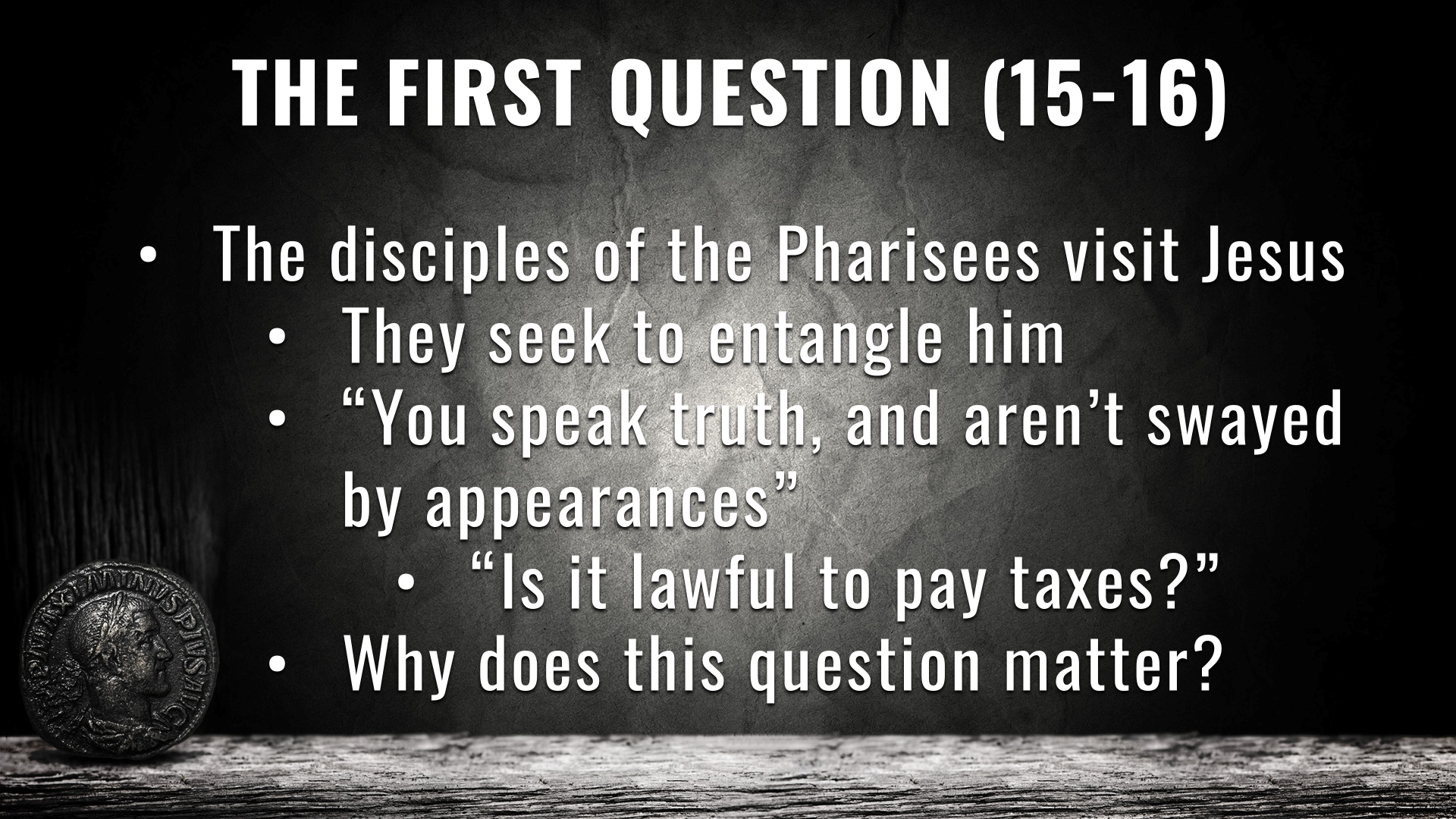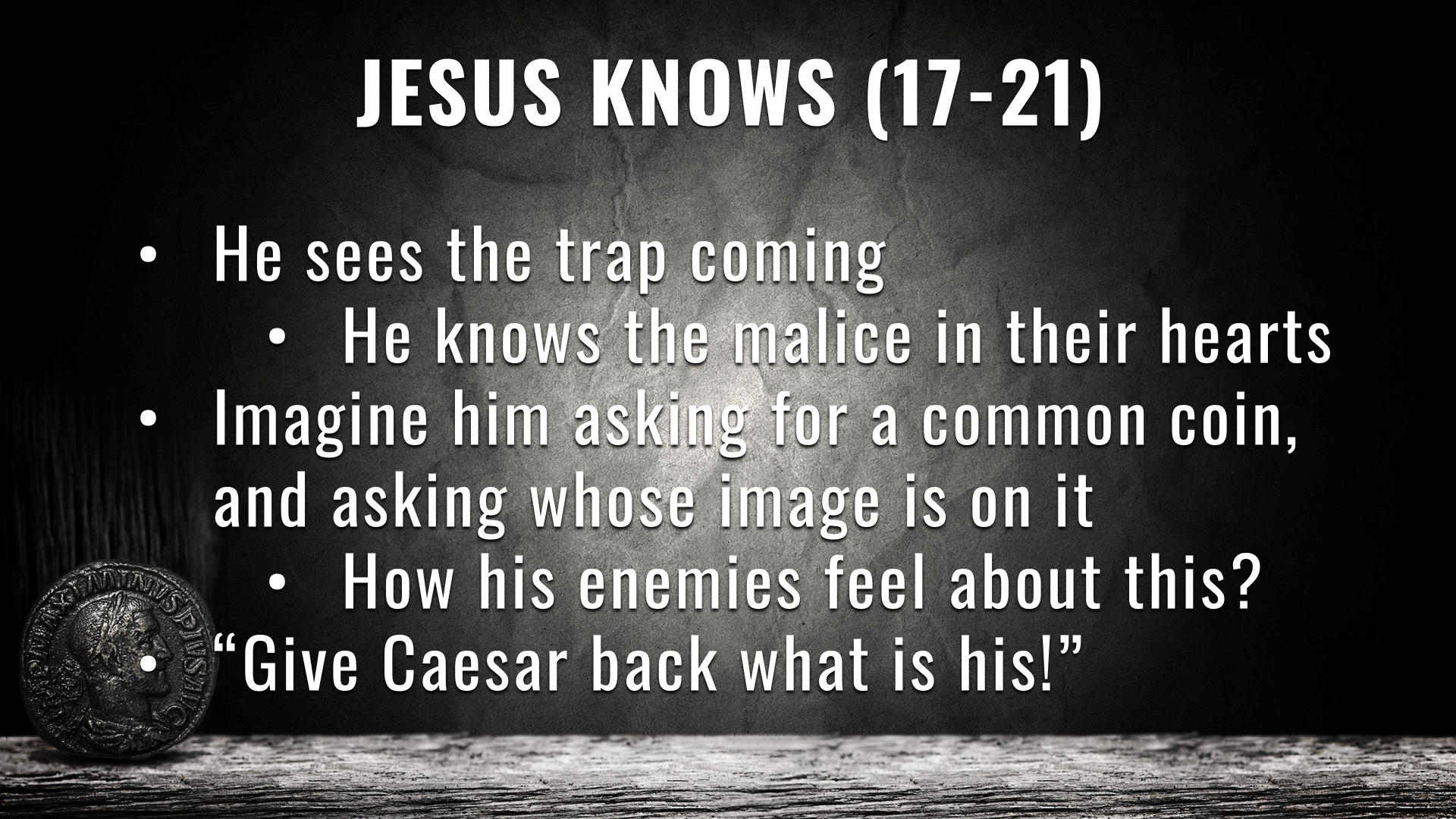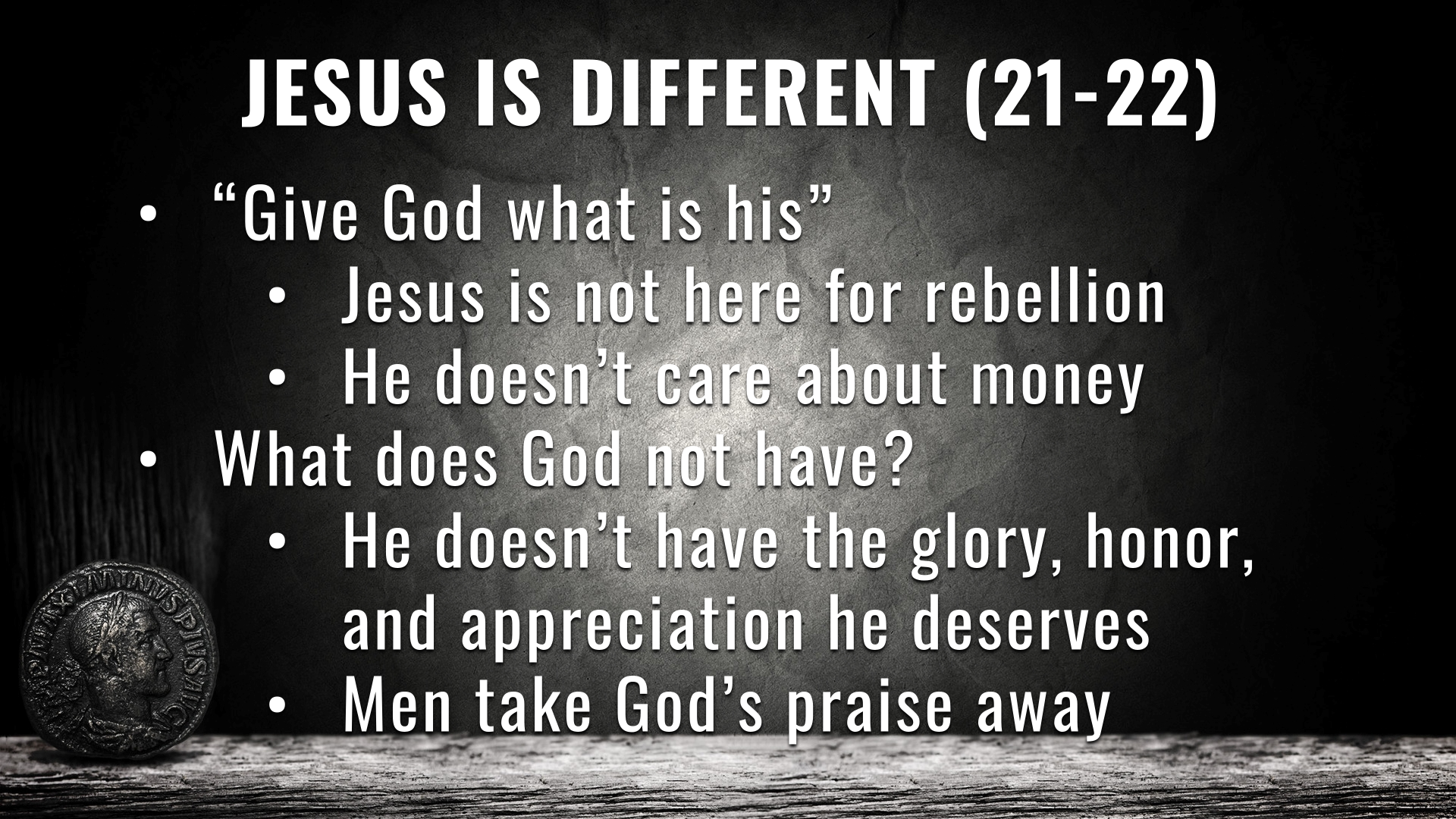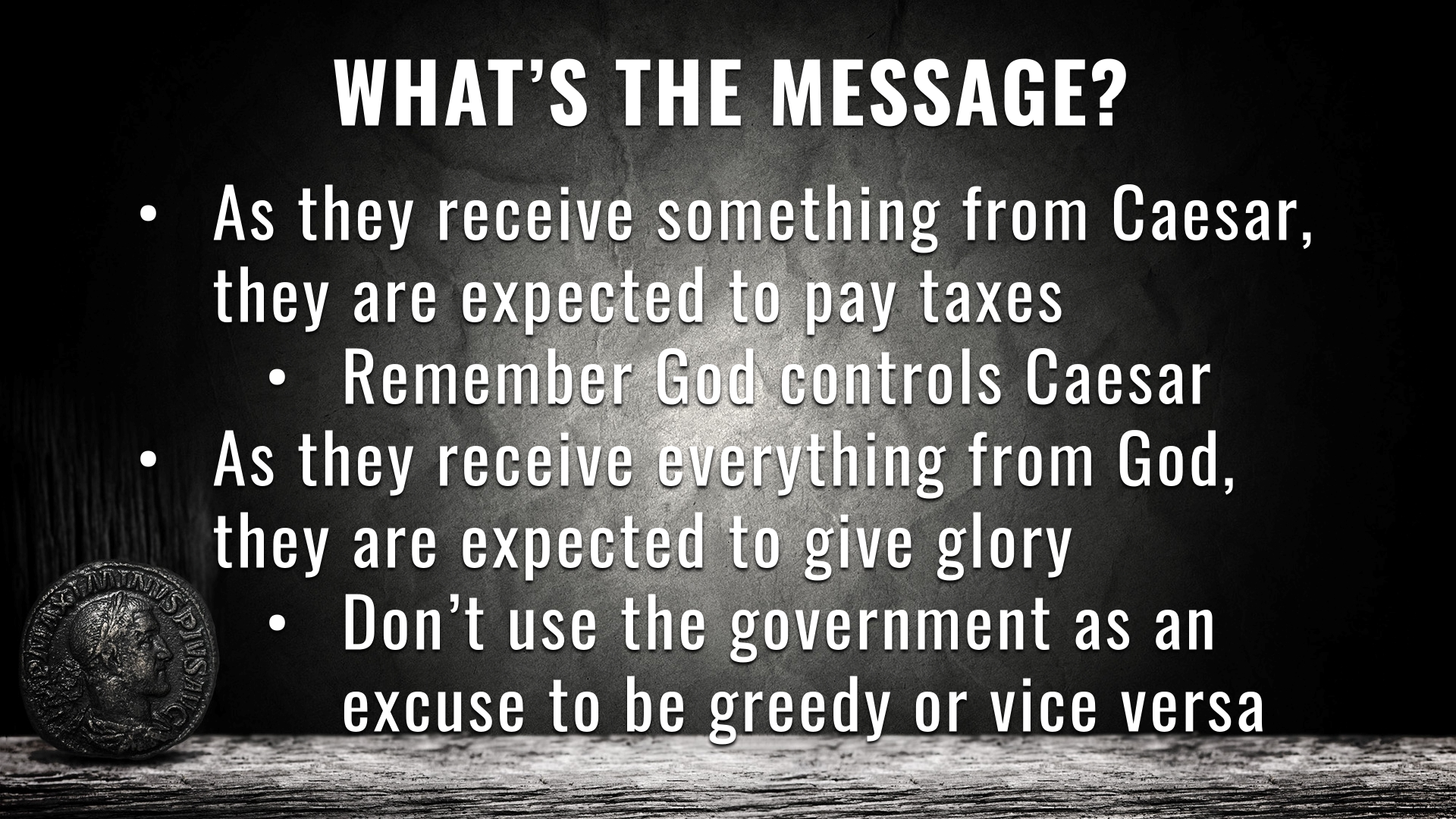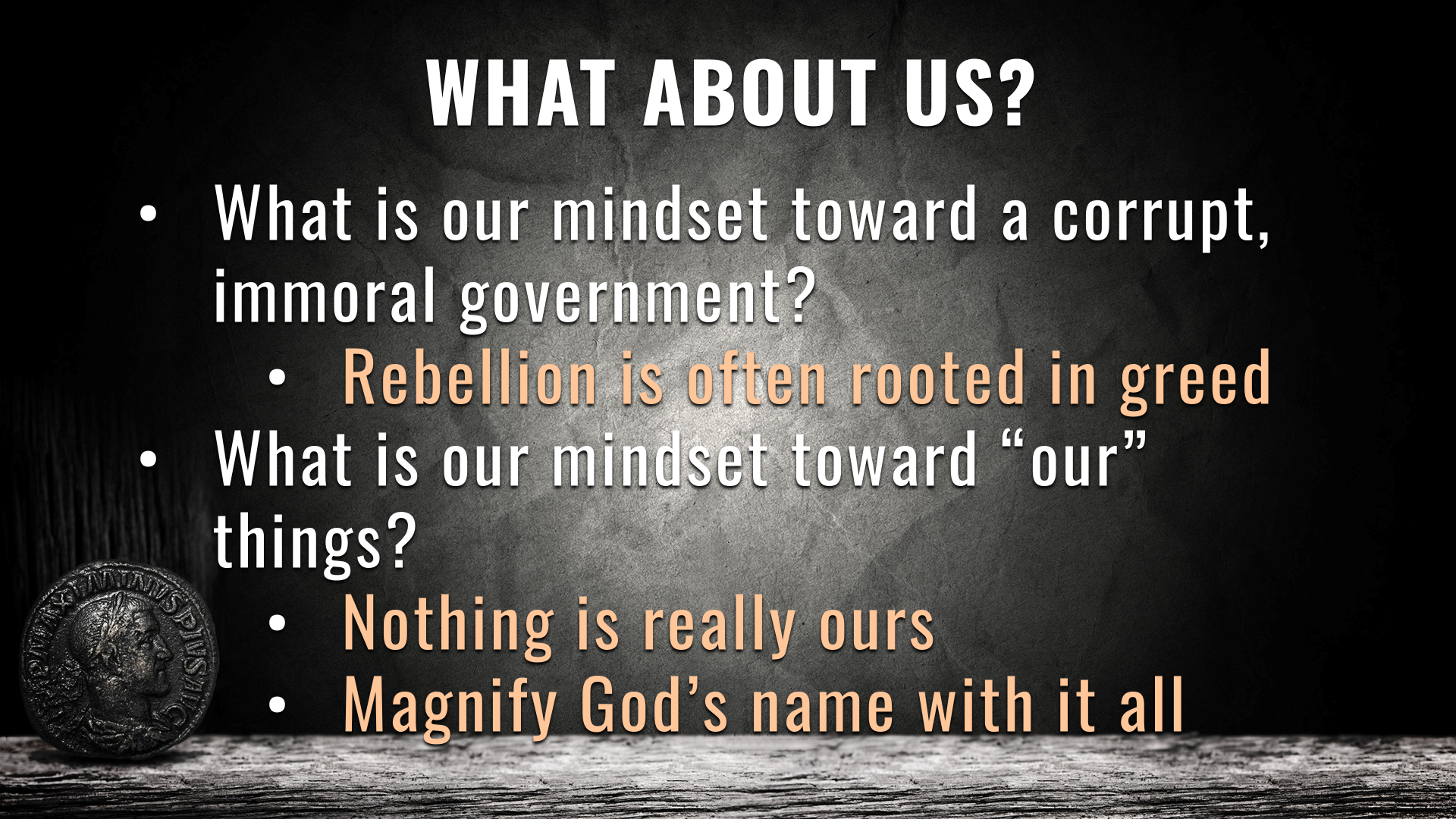What Is God's (Matthew 22:15-22)
As we study this portion of Matthew, we have seen how the Jewish leaders repeatedly fail to give Jesus any praise or exaltation. They refuse to believe he is who he says he is. We now come to a part in Jesus' last week where the rulers of the Pharisees, Sadducees, and scribes ask him questions to see if he is who he says he is. The sad part is that they should already know. Jesus has already passed every test and shown himself to be the Son of God. These men are not looking for a reason to believe. They are looking for a reason to disbelieve.
Today we will be looking at a question Jesus was asked and seeing how he responds in Matthew 22:15-22. If we go back and consider the context, Matthew makes it sound like all of the conversations of Jesus are taking place on the same day that Jesus caused the fig tree to whither in 21:18. Imagine being the disciples who witnessed the fig tree whither and then watching Jesus demonstrate that there is no fruit in Jerusalem. He has done this with three parables---the two sons, the vineyard, and the wedding feast. Now there will be three questions.
Fake Glory
Matthew 22:15--16 (ESV) --- 15 Then the Pharisees went and plotted how to entangle him in his words. 16 And they sent their disciples to him, along with the Herodians, saying, “Teacher, we know that you are true and teach the way of God truthfully, and you do not care about anyone’s opinion, for you are not swayed by appearances.
The Pharisees are a religious group that has been after Jesus for a long time now. They have tested him and sought to discredit him on multiple occasions. Now, they try to send their disciples to him to "entangle him in his words." Notice that the Pharisees don't just send their disciples. They send the Herodians along with them. We don't really know who the Herodians are, but we can gather from their name that they are supporters of Herod.
What are they planning?
The first words that come out of the disciples' mouths sound great! They recognize that Jesus is the "Teacher" or "Master." They point out that he is true, he teaches the way of God truthfully, and he doesn't care about anyone's opinion. Interestingly, they say that Jesus is not "swayed by appearances." This very statement should tell them that this is a bad idea. But did you hear these words of flattery? They are trying to give Jesus the impression that they are on his side. This is how evil people work. They deceive and manipulate so that people will lower their guard and give them what they want. All of the things they say about Jesus are true. He is the true teacher who sees right through the Pharisees' hypocrisy. It's fascinating how these words seem to give Jesus glory, but they are given under falsehood. They don't really mean what they say. They aren't seeking to glorify Jesus. They want to tear down his image.
The Trick Question
After all of this build-up, they ask if it is lawful for them to pay taxes to Caesar or not. We need to know the motivation behind this question. Why are they asking this?
The Jewish people have lived for the better part of a thousand years under oppression from a foreign government. They paid tribute in the past, but now they are restored on their land that God has promised them. They shouldn't have to pay tribute anymore because God has promised them a kingdom like David's. They believe that paying tribute to a ruling monarchy or empire is a failure to trust God. After all, they are in a covenant relationship with God. So many of them hate paying taxes, even though they enjoy the benefits of Rome's infrastructure. Many Jews have stirred up a rebellion against paying taxes. So, it is likely that the Jews want Herod and the Romans to take care of Jesus for them.
Jesus Knows
Matthew 22:17--21 (ESV) --- 17 Tell us, then, what you think. Is it lawful to pay taxes to Caesar, or not?” 18 But Jesus, aware of their malice, said, “Why put me to the test, you hypocrites? 19 Show me the coin for the tax.” And they brought him a denarius. 20 And Jesus said to them, “Whose likeness and inscription is this?” 21 They said, “Caesar’s.” Then he said to them, “Therefore render to Caesar the things that are Caesar’s, and to God the things that are God’s.”
The response of Jesus shows that he understands what they are doing. He sees the trap they are setting and addresses it perfectly. Matthew tells us that he was aware of their malice. Consider that no one else probably was aware of this. This might have looked like an honest question to the crowds and disciples. They might have believed that Jesus was about to steal some of the Pharisee disciples away from them. But his words cut right through the flattery. He says, "Why put me to the test, you hypocrites!" These are harsh words, but they don't seem to mind. The word hypocrite means actor, so they act like they are genuinely interested in Jesus' response. The truth is that they want him to be entangled so that he will be killed. They are acting righteous while being full of malice in their hearts.
A Graven Image
After calling them that, he asks for a denarius. This would be a common coin to the people, representing a day's wage. Then, he asks them, "Whose likeness and inscription is this?" Everyone knows that Caesar's image is on the coin. Caesar wanted the people to worship him, so it was only fitting for him to put his face on their money. But to the Jews, graven images were evil. They had been destroyed for worshiping idols. It was considered evil to carry around something with a graven image. However, they needed that money to pay for things. Jesus has the coin brought before them, and we can imagine everyone considers the evil of it. The Pharisees are probably beaming. They probably think that they have him cornered. Jesus will speak out against Roman oppression and be put to death. But the following words of Jesus come as a shock to everyone.
Jesus tells them to give to Caesar what belongs to him. If those coins bear his image, they belong to him. Jesus says, "Don't hold on to them. Don't seek to keep as many of them as you can. Give them back!" The Pharisees have a significant heart issue when it comes to money. They love money and want to keep as much of it for themselves as they can.
They want to be subject to no one, but they fail to recognize that the reason they are subject to Rome is that God has subjected them.
A Different Perspective
It is not as though God has somehow lost control. He always provides a foreign force to keep his people humble and prevent them from persisting in sin. These words also show that Jesus has no desire to get their money. He is not concerned with becoming rich off of the people. He is not concerned about receiving the fruit and glory for himself. He doesn't want to steal it away from the government. Render to Caesar the things that are Caesar's.
Then, he says something profound. He says, "Render to God the things that are God's." Think about this? What belongs to God? Our initial response is to say, "Everything belongs to God. That is true. But what bears the inscription and image of God explicitly? We do. In Genesis 1:26-27, God created man in his image. Jesus wants us to see ourselves as belonging to God. We are his image-bearers. As kings would have paintings, statues, and monuments that reflect their image, we were created to reflect God's glory. As Caesar expects to receive back what is his, God expects to receive back his. God wants the glory due him! When the Jews heard this, they marveled.
Matthew 22:22 (ESV) --- 22 When they heard it, they marveled. And they left him and went away.
They won't change their ways, but they marveled at the wisdom and truth of his words. There is no arguing against him.
What's The Message?
When we read this text in the context, it makes complete sense. Jesus is trying to get the Jews to give glory to God and stop seeking glory for themselves. Why is this so hard for them to wrap their minds around? God blessed the Jews with so much, and now he expects them to turn to God and give him the glory he deserves. But this text shows us that the Jews aren't happy with what God has given to them. They feel oppressed and cheated as though God has not given them the proper restoration they deserve. Jesus wants them to see that they are living under Roman control because God ordained it. He is in power and has control over the Romans, so it makes no sense to rebel against Rome. They want to rebel against Rome because they want more money for themselves.
But Jesus shows us that God wants them to let go of their money and give back to their government what they want. He doesn't want them to use the government as an excuse for not giving God what he deserves, or vice versa. So they need to stop being greedy.
What About Us?
It's easy to look at this story and judge the Pharisees for such a question. We all know that we ought to pay our taxes. It's morally good to do so. However, this question touches on much deeper issues than paying taxes.
How do we respond to government action?
This text addresses our response to government action. We ought to be people who submit to the governing authorities. We don't want to overthrow our government through force or rebellion. We don't seek a government that operates at no cost to us. Jesus wants us to see that our mission is to give and not to keep. This might open up several questions in our minds. What about the very actions that made us a country? Should we blindly obey everything the government tells us to do? What about the immoral way the government uses our taxes? In some ways, these questions are seeking to justify radical, rebellious behavior. Was Rome any different? But these are valid questions. The events leading up to this country are fascinating, and I don't claim to have all the answers as to whether men's actions were morally good or evil. But this text, much of the Old Testament (to include Daniel, which we are about to study), and Romans 13, shows us that God works in the kingdoms of men for our good. If they ever try to force us to do something immoral or go against what God wants us to be, we must resist respectfully. If the choice is between worshiping and serving God and submitting to the government, we always choose God. Even if it means we lose our lives, we choose God. But that's not ideal. We want to serve God while submitting to the government and by submitting to the government. It's always wrong to rebel against your parents when they command you to clean your room. That is not unjust oppression. It is just something we don't want to do as children, and we have to get over it because God says so.
We should feel very blessed to live in a benevolent society. Historically, governments have tried to combine church and state to create a tyrannical and oppressive system. Our country, at this point, allows religious liberty. But there have been numerous attempts to combine religious idealogy and legislature. This leads to all kinds of problems. Some laws are needed to maintain order and have peace, but trying to legislate morality creates oppression without adding any real value. You cannot legislate a heart change. So we should respond with respect and honor those in authority as though they are appointed by God.
How do we view "our" things?
This leads to the second application point. What does our heart look like when we consider our stuff? We have to escape the common misconception that everything is mine to enjoy as I please. We like to act like we are the masters of our possessions when we are actually stewards. This is dangerous thinking. What do we have that we have not received? Even the abilities that we have which earn us money are not our own. The air we breathe is not our own. Why do we act like we have not received everything from God?
What would it look like for us to give to God what is his? How do we give God glory and fruit? Jesus is pointing out throughout this section, the first step in giving God glory is recognizing that we are made to bear his image. Second, it is implied that we must recognize who Jesus is and accept him as the Messiah. That confession and submission to Jesus is a recognition of all the work that God has done for us.
But once we recognize that, how should we feel, and what should we do? God calls us to be his beloved children through Jesus. We must live like God and Jesus. To be God's image-bearers does not mean that we are superior to others. It means that we submit to others with humility and love. God is expecting us to live holy and upright lives full of honesty, integrity, and love. God expects us to build up the body of Christ so that we show the world how great Jesus was on the earth. God expects us to call others into this blessing. We don't make excuses to rebel. We don't try to keep all of our money and stuff for ourselves. We see it all as belonging to God, and as we evangelize, we must not turn people away by being evil or hateful. If they turn away, it should be because they refuse to give God glory like these Jews.
Are we looking for reasons to disbelieve?
The final application point I want to make is considering the Pharisees and their attitude toward Jesus. Is that you? Do you resist believing in him and giving him your all? Are you looking for a reason not to believe in him? Give God the glory he deserves. There is no doubt that he created you in his image. Your life has a purpose. That purpose is being to the praise of his glory. We all must be transformed to be like him. I know God is asking a lot of you. He is asking you to give more than just a few hours a week. He is asking you to give him everything, heart, soul, mind, and strength. But he is the one who gives you everything to enjoy, and he is worthy of tremendous praise, adoration, and worship. Don't resist because you want some level of satisfaction in this world. Don't be greedy for glory and fruit that's not yours. Enjoy what God gives you, but give glory and fruit back to God with a thankful heart.


